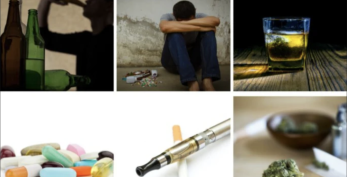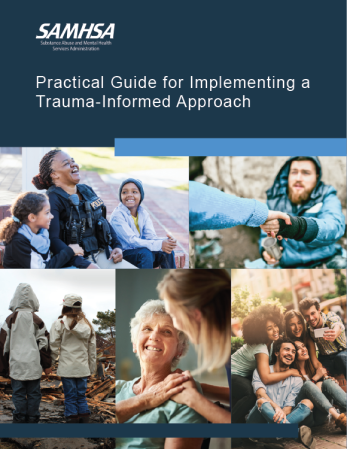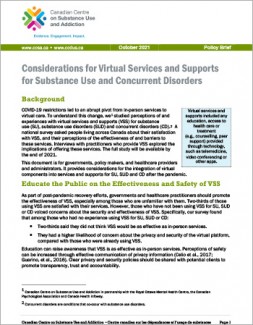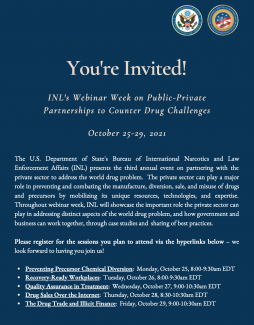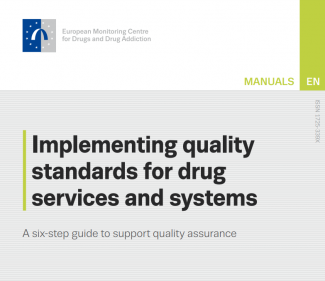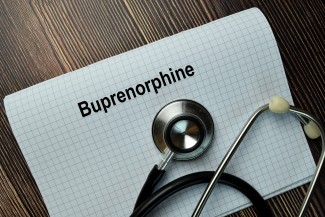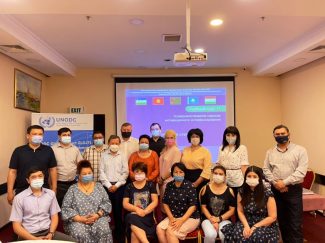Search
Quality Assurance
The application and integration of the best available research, clinical expertise, quality marks and patient preferences to ensure high-quality care in substance use disorders services.
Considerations for Virtual Services and Supports for Substance Use and Concurrent Disorders [Policy Brief]
The Canadian Centre for Substance Use and Addiction (CCSA) in partnership with the Royal Ottawa Mental Health Centre, the Canadian Psychological Association and Canada Health Infoway, collected national data on the experience and...
Trends in healthcare expenditures and resource utilization among a nationally representative population with opioids in the United States: a serial cross-sectional study, 2008 to 2017
One of the most serious public health concerns in recent decades has been the opioid epidemic in the United States (US). Over 9.9 million Americans aged 12 and up abused prescription pain drugs in 2018, and roughly 2 million Americans were...
INL's Webinar Week
The U.S. Department of State's Bureau of International Narcotics and Law Enforcement Affairs (INL) presents the third annual event on partnering with the private sector to address the world drug problem.
The private sector can play a major...
Implementing quality standards for drug services and systems: a six-step guide to support quality assurance
Are former heavy drinkers in the UK less likely to identify as being in recovery compared to those in the USA? A pilot test
The Alcoholics Anonymous (AA) movement created the term "in recovery" to express the continuing requirement for vigilance in order to sustain sobriety (which includes abstinence from alcohol intake) and avoid a return to dangerous drinking...
Psychosocial Interventions to Improve Psychological, Social and Physical Wellbeing in Family Members Affected by an Adult Relative’s Substance Use: A Systematic Search and Review of the Evidence
The use of alcohol and drugs is a significant public health concern and is prevalent in families. Over 100 million people are thought to be affected by a close relative's substance use, with many experiencing negative health and social...
UNODC supports a Quality Assurance Training for Drug Use Disorder Treatment Services in Senegal
The UNODC Regional Office for West and Central Africa (ROSEN) and the Prevention, Treatment and Rehabilitation Section in Vienna (PTRS), organized from June 14th to June 18th, an online Quality Assurance training, benefitting 16 drug...
Further Enhancing the Implementation of Quality Standards in Drug Demand Reduction Across Europe
The EU Strategy 2021-2025 puts further emphasis on QS and evidence-based interventions.
Yet, the extent and ways in which QS are implemented in daily practices of drug prevention, treatment and harm reduction in the EU varies substantially...
Quality and the Workforce
Reprint of: Biotechnologies and the future of opioid addiction treatments
Biotechnological treatment, including addiction treatment, is the way of the future. Researchers and pharmaceutical companies praise depot injections, agonist/antagonist implants, deep brain stimulation, and hapten conjugate vaccines as...
Identifying content-based engagement patterns in a smoking cessation website and associations with user characteristics and cessation outcomes: a sequence and cluster analysis
Tobacco smoking is the greatest cause of sickness and early death worldwide, with 8 million people dying each year from a smoking-related condition. The use of pharmaceutical or behavioural assistance improves smokers' chances of quitting...
Gender disparities in opioid treatment progress in methadone versus counselling
The high dropout rate (75%) in opioid use disorder (OUD) treatment among women and racial/ethnic minorities in the United States necessitates a better knowledge of the factors that contribute to treatment success. While therapy and...
High-dose buprenorphine induction in the emergency department for treatment of opioid use disorder
In response to the rising efficacy of the illicit opioid drug supply and often observed delays in access to follow-up therapy, emergency departments (EDs) occasionally utilize a high-dose buprenorphine induction method for the treatment of...
Variation in brief treatment for substance use disorder: a qualitative investigation of four federally qualified health centres with SBIRT services
Brief treatment (BT) or regular outpatient alcohol use or substance use disorder (SUD) treatment is a key element of the Screening, Brief Intervention, and Referral to Treatment (SBIRT) model. It can be an effective, short-term, and low...
Reporting treatment fidelity in behavioral tobacco treatment clinical trials: scoping review and measurement recommendations
Abstract
Introduction:
Adoption of rigorous standards for reporting treatment fidelity is essential for advancing discovery, validation, and implementation of behavioral treatments. Whereas the NIH Behavior Change Consortium (BCC)...
Chronic care treatment for smoking cessation in patients with serious mental illness: a pilot randomized trial
Background:
Rates of smoking among those with serious mental illness (SMI) are two to three times higher than for the general population. Smoking is rarely addressed in mental health settings. Innovative outreach and treatment strategies...
Smoking among inpatients in treatment for substance use disorders: prevalence and effect on mental health and quality of life
Background:
Smoking is still prevalent among people with substance use disorders. The objective of this study was to investigate the prevalence of smoking among patients in treatment for substance use disorders and to analyze the effect of...
Effectiveness of a digital alcohol moderation intervention as an add-on to depression treatment for young adults: study protocol of a multicentre pragmatic randomized controlled trial
Background:
Depressive disorders and problematic drinking often co-occur, also among young adults. These co-occurring conditions are associated with various negative health outcomes compared to both conditions alone. Early intervention by...
UNODC Keeps Supporting Quality Drug Treatment Service via Continuous Capacity Building
UNODC Regional Office for Central Asia supported regional training of trainers (ToT) on Course 11 “Enhancing Motivational Interviewing Skills”. This course is part of the Advanced Level of the Universal Treatment Curriculum for Substance...
Quality Assurance (QA) of the Drug Treatment Services in Pakistan
Share the Knowledge: ISSUP members can post in the Knowledge Share – Sign in or become a member

